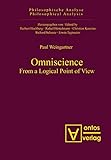Omniscience : from a logical point of view / Paul Weingartner.
Material type: TextSeries: Philosophische Analyse ; Bd. 23.Publication details: Frankfurt : Ontos Verlag, ©2008.Description: 1 online resource (188 pages)Content type:
TextSeries: Philosophische Analyse ; Bd. 23.Publication details: Frankfurt : Ontos Verlag, ©2008.Description: 1 online resource (188 pages)Content type: - 9783110327090
- 3110327090
- 3938793813
- 9783938793817
- 9783110326697
- 3110326698
- 212.7 22
- BT131 W456 2008
- online - EBSCO
| Item type | Current library | Call number | URL | Status | Notes | Barcode | |
|---|---|---|---|---|---|---|---|
 eBook
eBook
|
Biblioteca "Angelicum" Pont. Univ. S.Tommaso d'Aquino Nuvola online | online - EBSCO (Browse shelf(Opens below)) | Online access | Not for loan (Accesso limitato) | Accesso per gli utenti autorizzati / Access for authorized users | (ebsco)603694 |
Browsing Biblioteca "Angelicum" Pont. Univ. S.Tommaso d'Aquino shelves, Shelving location: Nuvola online Close shelf browser (Hides shelf browser)

|

|

|

|

|

|

|
||
| online - EBSCO Nurturing the prophetic imagination / | online - EBSCO Old Catholic and Philippine independent ecclesiologies in history : the Catholic Church in every place / | online - EBSCO Old English literature and the Old Testament / | online - EBSCO Omniscience : from a logical point of view / | online - EBSCO On Explaining Existence. | online - EBSCO On freedom, love, and power / | online - EBSCO On liturgical asceticism / |
Title from PDF title page (viewed on July 25, 2013).
Includes bibliographical references (pages 173-182) and index.
Preface; Contents; 1. Whether Everything is True What GodKnows; 2. Whether God Necessarily Knows WhateverHe Knows; 3. Whether God Knows Something at SomeTime; 4. Whether God Knows All Past and PresentEvents; 5. Whether God's Knowledge Exceeds HisPower; 6. Whether God Causes Everything What HeKnows; 7. Whether God Knows Singular Truths?; 8. Whether God's Knowledge of Singular, Contingent Truths Implies the Mutability ofGod; 9. Whether God Knows What Is Not; 10. Whether Knowledge or Truth Can Changethe Status of a State of Affairs; 11. Whether God Knows Future States ofAffairs.
12. Whether God Knows Everything That isTrue13. A Theory of Omniscience; LITERATURE; Subject Index; Name Index.
The aim of the book is to clarify the concept of omniscience. This is done first by discussing basic questions on omniscience (chs. 1-12) and secondly by offering a theory of omniscience as an axiomatic system in which also a definition of omniscience is given (ch. 13). The twelve chapters deal with questions like whether everything is true what God knows, whether God ́s knowledge is bound to time, whether it concerns singular truths or only laws, whether it extends also to contingent futureevents.etc. The book is neither a book about the existence of God nor about proofs for his existence. It is.


